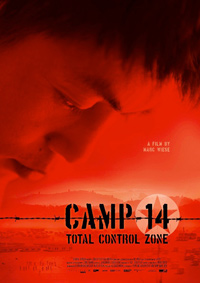Daring Us To Complain: Wiese Shows Us North Korea From The Inside
 Behind the heavily barricaded borders of North Korea lay a slew of labor camps that are home to those deemed as criminals of the state. Most of these 200,000 so called ‘criminals’ are interned for committing such crimes as defacing images of their now deceased supreme leader Kim Jong-il or other seemingly benign acts. Under constant surveillance, they must maintain obedience or risk being shot or violently tortured by the brainwashed guards. Shin Dong-Huyk was one of the countless unfortunates born within, but one of the very few lucky enough to escape alive. German director Marc Wiese chronicles Shin’s appalling life story in his penetrating docu feature debut, Camp 14: Total Control Zone, a tale so foreign to modern society that it almost seems the stuff of science fiction.
Behind the heavily barricaded borders of North Korea lay a slew of labor camps that are home to those deemed as criminals of the state. Most of these 200,000 so called ‘criminals’ are interned for committing such crimes as defacing images of their now deceased supreme leader Kim Jong-il or other seemingly benign acts. Under constant surveillance, they must maintain obedience or risk being shot or violently tortured by the brainwashed guards. Shin Dong-Huyk was one of the countless unfortunates born within, but one of the very few lucky enough to escape alive. German director Marc Wiese chronicles Shin’s appalling life story in his penetrating docu feature debut, Camp 14: Total Control Zone, a tale so foreign to modern society that it almost seems the stuff of science fiction.
Sitting on the floor of his barren apartment, Shin speaks as freely has he can bare. Growing up in a place where death is the punishment for nearly every misstep and watching frequent public executions is mandatory has shaped him in unfathomable ways. When he recounts the period in which he turned in his mother and brother for plotting escape (because the rules said he must), and in turn he himself was forced to endure daily torture for seven months only to see them executed before his eyes on the day of his release, Shin does not shed a single tear, but Wiese wisely allows the lengthy periods of anguished silence to play out in real time as Shin struggles to continue. Balancing innocence with atrocity, the director also speaks with a pair of ex-guards that feel it their duty to tell the truth of what happens behind the North Korean borders. They both obviously feel the weight of regret for the disgusting things they’ve done, but they none-the-less shockingly tell of how they’ve shot, tortured and manipulated the beings they were bound to watch, never thinking of them as humans, but insignificant creatures not worthy of life.
Camp 14: Total Control Zone is not just shocking in its depiction of life on the brink through interviews and smuggled camp footage, but also in how Shin describes the days following his escape. Imagine being an adult, witnessing for the first time actual free will – people wearing the clothes they want, talking to whomever they like, going wherever they choose. At first, for Shin it was nirvana, but as a complete alien to human society, now with his cellphone and finished hard wood flooring, being involved with human rights activism is not the fulfilling experience everyone around him seems to imply. He is hollow. Looking in, we can’t feel anything but grateful for our own lives, speckled with petty complaints and insignificant inconveniences. Wiese’s film is an astounding story of dehumanization and a horrifying reminder that bureaucratic evil is still very much alive and well.
Reviewed on September 7th at the 2012 Toronto Int. Film Festival – TIFF Docs Programme
104 mins.


